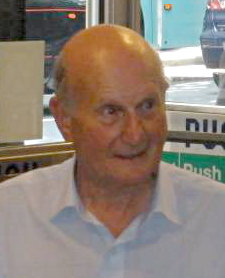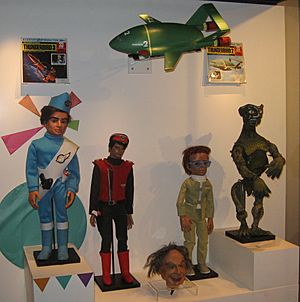Gerry Anderson facts for kids
Quick facts for kids
Gerry Anderson
|
|
|---|---|

Anderson in 2009
|
|
| Born |
Gerald Alexander Abrahams
14 April 1929 Bloomsbury, London, England
|
| Died | 26 December 2012 (aged 83) Henley-on-Thames, Oxfordshire, England
|
| Occupation |
|
| Years active | 1957–2005 |
| Employer | Lew Grade (1961–1976) |
| Organization | AP Films, Century 21, Group Three, Anderson Burr, Gerry Anderson Productions, Anderson Entertainment |
| Known for | Supercar, Fireball XL5, Stingray, Thunderbirds, Captain Scarlet, UFO, Space: 1999, Terrahawks, Joe 90 |
| Spouse(s) |
|
| Children | 4; including Jamie |
Gerry Anderson (born Gerald Alexander Abrahams; 14 April 1929 – 26 December 2012) was a famous English producer, director, and writer for television and film. He is best known for his amazing futuristic TV shows, especially those from the 1960s. These shows used a special puppet technique called "Supermarionation," where puppets had electric parts that made them move.
His first TV show for kids was The Adventures of Twizzle in 1957. Later, he created other popular puppet series like Supercar and Fireball XL5. But his most famous show was Thunderbirds, which became a huge hit in the mid-1960s. Other well-known shows from that time include Stingray and Captain Scarlet and the Mysterons.
Gerry Anderson also made live-action shows and movies. Even after a quiet period in his career, his older puppet shows became popular again, leading to new projects like a computer-animated remake of Captain Scarlet in 2005.
Contents
Early Life and Inspirations
Gerry Anderson was born Gerald Alexander Abrahams in London, England, on 14 April 1929. His family later changed their last name to "Anderson" in 1939.
During World War II, Gerry's older brother, Lionel, joined the Royal Air Force (RAF). Lionel often wrote letters home, and in one letter, he mentioned an air base called Thunderbird Field. This name stuck in Gerry's mind and later inspired the title for his most famous show, Thunderbirds. Sadly, Lionel was killed in action in 1944.
Gerry married Betty Wrightman in 1952, and they had two daughters, Linda and Joy.
Starting His Career
Gerry Anderson began his career in photography and later became interested in film editing. After serving in the RAF, he worked on various films.
In the mid-1950s, Gerry joined a TV production company. There, he met cameraman Arthur Provis. Together with Reg Hill and John Read, they formed a new company called AP Films (Anderson-Provis Films).
AP Films' first TV show was The Adventures of Twizzle (1957–1958), a children's series about a doll. This was Gerry's first time working with puppets. It also marked the beginning of his work with talented people like puppeteer Christine Glanville, special effects expert Derek Meddings, and composer Barry Gray. Even though his puppet shows became famous, Gerry always hoped to make live-action films and TV dramas.
The Magic of Supermarionation
AP Films' third series was Four Feather Falls (1959–60). This show was the first to use an early version of the special puppet technique that would later be called "Supermarionation."
The company faced financial problems until Lew Grade, the head of Associated Television (ATV), offered to buy their new puppet series. This started a long and successful partnership between Gerry Anderson and Lew Grade.
The new series, Supercar (1960–61), was created by Gerry and Sylvia Anderson (who became his second wife in 1960) and Reg Hill. Supercar was the official debut of Supermarionation. This electronic system made the puppets look more alive. It used sounds from pre-recorded voices to make the puppets' lips move in sync with the words.

AP Films also created a separate company to handle the toys and merchandise for their shows, which became very successful.
Their next series was the space adventure Fireball XL5 (1962). It was a big hit and was even sold to an American TV network, NBC. Around this time, Lew Grade bought AP Films, and the company later became known as Century 21 Productions.
After the buyout, Century 21 began making Stingray (1964). This was the first British TV series using Supermarionation to be filmed in color. They moved to bigger studios, which allowed for even better special effects, especially for underwater scenes. They also improved the puppets, giving them different interchangeable heads to show various expressions.
The Success of Thunderbirds
Century 21's next big project was Thunderbirds (1965–1966). Gerry was inspired to create a show about a rescue organization after a real-life mining disaster in Germany. The dramatic title came from the air base name his brother Lionel had mentioned during the war.
Lew Grade loved the idea and wanted 25-minute episodes. However, after seeing the first completed episode, he was so impressed that he insisted the episodes be extended to fifty minutes! This meant a much bigger budget and more work, but everyone believed Thunderbirds would be a huge success. Sylvia Anderson, Gerry's wife, voiced the popular character Lady Penelope.
Thunderbirds made Gerry Anderson and his team world-famous. However, the show was cancelled after part of the second series because Lew Grade couldn't sell it to a major American network. Even so, it became incredibly popular in the UK and other countries.
After Thunderbirds, Century 21 made Captain Scarlet and the Mysterons (1967). This show featured even more realistic puppets, thanks to smaller electronic parts that allowed the puppets to have more human-like proportions.
Their next puppet series was Joe 90 (1968), about a young secret agent. This was the last of the classic Supermarionation shows.
Beyond Puppets: Live-Action Shows
Gerry Anderson then moved into live-action projects, combining special effects with real actors. His film Doppelgänger (1969), also known as Journey to the Far Side of the Sun, was nominated for an Academy Award for its special effects.
In 1969, the Andersons started production on UFO, Century 21's first full live-action TV series. This science fiction show was more grown-up than his puppet series, mixing action and special effects with serious drama.
Gerry Anderson also produced The Protectors, an action series that was very successful in the UK and America.
Space: 1999
After The Protectors, Gerry Anderson created Space: 1999. This was a very expensive science fiction series for its time. It imagined a future where a huge explosion on the Moon sends it flying out of Earth's orbit and into deep space. The show starred American actors Martin Landau and Barbara Bain.
Space: 1999 was successful enough to have a second season. This show marked the end of Gerry Anderson's long partnership with ATV.
Later Career and Legacy
In the early 1980s, Gerry Anderson formed a new company, Anderson Burr Pictures. Their first show was Terrahawks, which marked Gerry's return to puppets. However, instead of marionettes, this series used advanced glove puppets, inspired by the work of Jim Henson. Terrahawks was about a secret organization defending Earth from aliens and ran successfully from 1983 to 1986.
The popularity of Thunderbirds and his other Supermarionation shows grew steadily over the years. In the early 1990s, Thunderbirds was shown again on BBC2 in the UK and became incredibly popular, even more so than its original run! This led to a huge demand for toys and merchandise.
Gerry Anderson became very popular again, making many appearances and giving talks about his career. He also worked on new TV shows like Space Precinct (1994) and Lavender Castle (1999), which combined stop-motion animation with computer graphics.
In the late 1990s, Anderson began working on a computer-animated sequel to Captain Scarlet, which later became Gerry Anderson's New Captain Scarlet, released in 2005. This show was the most expensive children's program ever made in the UK at the time.
Gerry Anderson was recognized for his contributions to animation and was appointed a Member of the Order of the British Empire (MBE) in 2001.
He was approached about a live-action Thunderbirds film in 2004 but was not involved in its production. He did not like the film that was made.
In 2005, Thunderbirds celebrated its 40th Anniversary, and many new toys and products were released. His shows continued to be re-run on TV channels.
In June 2012, it was announced that Gerry Anderson had been diagnosed with Alzheimer's disease.
Death and Tributes
Gerry Anderson passed away peacefully in his sleep on 26 December 2012, at the age of 83, after living with dementia for several years. His son, Jamie Anderson, announced the sad news.
Many people from the world of television and radio paid tribute to Gerry Anderson. TV presenter Jonathan Ross tweeted that Gerry's work "made childhood an incredible place to be" for men of his age. Actor Brian Blessed, who worked with Anderson, said, "I think a light has gone out in the universe. He had a great sense of humour."
The chairman of Fanderson (a fan club for Gerry Anderson's work) said that Gerry was a quiet but determined man whose desire to make the best films inspired his teams to create amazing works. He added that Gerry's legacy is how he inspired so many people and continues to bring joy to millions around the world.
Gerry Anderson's funeral was held on 11 January 2013. His son Jamie said that his father wanted fans to attend, alongside friends and family. Jamie also shared how touched the family was by messages from fans all over the world.
At the funeral, Gerry Anderson's coffin was decorated with a floral Thunderbird 2. Music from Thunderbirds and Stingray was played. Many people attended, including Shane Rimmer, who voiced Scott Tracy in Thunderbirds.
Continuing His Legacy
After Gerry Anderson's death, his younger son Jamie announced that his company, Anderson Entertainment, would continue to develop projects that Gerry had not been able to finish. These projects are often funded by fans through crowdfunding.
In 2013, the first legacy project was announced: a series of novels called Gemini Force One. A pilot episode for a new puppet-based science fiction series called Gerry Anderson's Firestorm was also released online in 2019. This new show uses a modern version of Supermarionation called "Ultramarionation."
Filmography
Film
Filmmaking credits
| Year | Title | Director | Producer | Writer | Notes |
|---|---|---|---|---|---|
| 1960 | Crossroads to Crime | Yes | Yes | ||
| 1966 | Thunderbirds Are Go | Executive | Yes | ||
| 1968 | Thunderbird 6 | Executive | Yes | ||
| 1969 | Doppelgänger | Yes | Yes | Also known as Journey to the Far Side of the Sun | |
| 2000 | Captain Scarlet and the Return of the Mysterons | Yes | Yes | Yes | Short film, a pilot for the 2005 series |
Television
Filmmaking credits
| Year | Title | Director | Producer | Writer | Creator | Notes |
|---|---|---|---|---|---|---|
| 1957-58 | The Adventures of Twizzle | Yes | Yes | 39 episodes | ||
| 1959 | Torchy the Battery Boy | Yes | Yes | 26 episodes | ||
| 1960 | Four Feather Falls | Yes | Yes | Yes | 39 episodes | |
| 1961-62 | Supercar | Yes | Yes | Yes | Yes | 39 episodes |
| 1962-63 | Fireball XL5 | Yes | Yes | Yes | Yes | 39 episodes |
| 1964-65 | Stingray | Yes | Yes | Yes | 40 episodes | |
| 1965-66 | Thunderbirds | Yes | Yes | Yes | 31 episodes | |
| 1967-68 | Captain Scarlet and the Mysterons | Yes | Yes | Yes | 32 episodes | |
| 1968-69 | Joe 90 | Yes | Yes | 30 episodes | ||
| 1969 | The Secret Service | Yes | Yes | 13 episodes | ||
| 1970-71 | UFO | Yes | Yes | Yes | Yes | 26 episodes |
| 1972-74 | The Protectors | Yes | Yes | 52 episodes | ||
| 1975-76 | Space: 1999 | Yes | Yes | 48 episodes | ||
| 1983-86 | Terrahawks | Yes | Yes | Yes | 39 episodes | |
| 1987 | Dick Spanner, P.I. | Yes | 22 episodes | |||
| 1994-95 | Space Precinct | Yes | Yes | 25 episodes | ||
| 1999 | Lavender Castle | Yes | Yes | Yes | 26 episodes | |
| 2005 | Gerry Anderson's New Captain Scarlet | Yes | Yes | 26 episodes |
Voice acting credits
| Year | Title | Voice role | Notes |
|---|---|---|---|
| 1962-63 | Fireball XL5 | Robert the Robot / Other roles | 37 episodes |
| 2015 | Terrahawks | Zeroid 29 (posthumous) | 1 audio story |
Other Works
- Gemini Force One (2008, continued after his death) – novel series
- Calling Elvis for Dire Straits (1991) – music video (co-producer)
See also
 In Spanish: Gerry Anderson para niños
In Spanish: Gerry Anderson para niños
 | Aurelia Browder |
 | Nannie Helen Burroughs |
 | Michelle Alexander |


